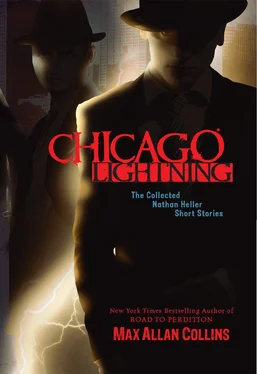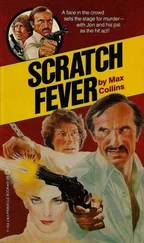Max Collins - Chicago Lightning
Здесь есть возможность читать онлайн «Max Collins - Chicago Lightning» весь текст электронной книги совершенно бесплатно (целиком полную версию без сокращений). В некоторых случаях можно слушать аудио, скачать через торрент в формате fb2 и присутствует краткое содержание. Жанр: Криминальный детектив, на английском языке. Описание произведения, (предисловие) а так же отзывы посетителей доступны на портале библиотеки ЛибКат.
- Название:Chicago Lightning
- Автор:
- Жанр:
- Год:неизвестен
- ISBN:нет данных
- Рейтинг книги:5 / 5. Голосов: 1
-
Избранное:Добавить в избранное
- Отзывы:
-
Ваша оценка:
- 100
- 1
- 2
- 3
- 4
- 5
Chicago Lightning: краткое содержание, описание и аннотация
Предлагаем к чтению аннотацию, описание, краткое содержание или предисловие (зависит от того, что написал сам автор книги «Chicago Lightning»). Если вы не нашли необходимую информацию о книге — напишите в комментариях, мы постараемся отыскать её.
Chicago Lightning — читать онлайн бесплатно полную книгу (весь текст) целиком
Ниже представлен текст книги, разбитый по страницам. Система сохранения места последней прочитанной страницы, позволяет с удобством читать онлайн бесплатно книгу «Chicago Lightning», без необходимости каждый раз заново искать на чём Вы остановились. Поставьте закладку, и сможете в любой момент перейти на страницу, на которой закончили чтение.
Интервал:
Закладка:
Her eyes had a twinkle, like broken glass. “Things…. Interested?”
“Sure, Katie.”
And it was just that easy.
Three days earlier, I had been seated at a conference table in the spacious dark-wood and pebbled-glass office of the Public Safety Director in Cleveland’s City Hall.
“It’s going to be necessary to swear you in as a part of my staff,” Eliot Ness said.
I had known Eliot since we were both teenagers at the University of Chicago. I’d dropped out, finished up at a community college and gone into law enforcement; Eliot had graduated and became a private investigator, often working for insurance companies. Somewhere along the way, we’d swapped jobs.
His dark brown hair brushed with gray at the temples, Eliot’s faintly freckled, boyish good looks were going puffy on him, gray eyes pouchy and marked by crow’s feet. But even in his late thirties, the former Treasury agent who had been instrumental in Al Capone’s fall was the youngest Public Safety Director in the nation.
When I was on the Chicago P.D., I had been one of the few cops Eliot could trust for information; and when I opened up the one-man A-1 Detective Agency, Eliot had returned the favor as my only trustworthy source within the law enforcement community. I had remained in Chicago and he had gone on to more government crimebusting in various corners of the Midwest, winding up with this high profile job as Cleveland’s “top cop”; since 1935, he had made national headlines cleaning up the police department, busting crooked labor unions and curtailing the numbers racket.
Eliot was perched on the edge of the table, a casual posture at odds with his three-piece suit and tie. “Just a formality,” he explained. “I caught a little heat recently from the City Council for hiring outside investigators.”
I’d been brought in on several other cases, over the past five or six years.
“It’s an undercover assignment?”
He nodded. “Yes, and I’d love to tackle it myself, but I’m afraid at this point, even in the Angles, this puss of mine is too well-known.”
Eliot, a boyhood Sherlock Holmes fan, was not one to stay behind his desk; even as Public Safety Director, he was known to lead raids, wielding an ax, and go undercover, in disguise.
I said, “You’ve never been shy about staying out of the papers.”
I was one of the few people who could make a crack like that and not get a rebuke; in fact, I got a little smile out of the stone face.
“Well, I don’t like what’s been in the papers, lately,” he admitted, brushing the stray comma of hair off his forehead, for what good it did him. “You know I’ve made traffic safety a priority.”
“Sure. Can’t jaywalk in this burg without getting a ticket.”
When Eliot came into office, Cleveland was ranked the second un-safest city in America, after Los Angeles. By 1938, Cleveland was ranked the safest big city, and by 1939 the safest city, period. This reflected Eliot instituting a public safety campaign through education and “warning” tickets, and reorganizing the traffic division, putting in two-way radios in patrol cars and creating a fleet of motorcycle cops.
“Well, we’re in no danger of receiving any ‘safest city’ honors this year,” he said, dryly. He settled into the wooden chair next to mine, folded his hands prayerfully. “We’ve already had thirty-two traffic fatalities this year. That’s more than double where we stood, this time last year.”
“What’s the reason for it?”
“We thought it had to do with increased industrial activity.”
“You mean, companies are hiring again, and more people are driving to work.”
“Right. We’ve had employers insert ‘drive carefully’ cards in pay envelopes, we’ve made elaborate safety presentations…. There’s also an increase in teenage drivers, you know, kids driving to high school.”
“More parents working, more kids with cars. Follows.”
“Yes. And we stepped up educational efforts, at schools, accordingly. Plus, we’ve cracked down on traffic violators of all stripe-four times as many speeding arrests; traffic violations arrests up twenty-five-percent, intoxication arrests almost double.”
“What sort of results are you having?”
“In these specific areas-industrial drivers, teenage drivers-very positive. These are efforts that went into effect around the middle of last year-and yet this year, the statistics are far worse.”
“You wouldn’t be sending me undercover if you didn’t have the problem pinpointed.”
He nodded. “My Traffic Analysis Bureau came up with several interesting stats: seventy-two percent of our traffic fatalities this year are age forty-five or older. But only twenty percent of our population falls in that category. And thirty-six percent of those fatalities are sixty-five or up…a category that comprises only four percent of Cleveland’s population.”
“So more older people are getting hit by cars than younger people,” I said with a shrug. “Is that a surprise? The elderly don’t have the reflexes of young bucks like us.”
“Forty-five isn’t ‘elderly,’” Eliot said, “as we’ll both find out sooner than we’d like.”
The intercom on Eliot’s nearby rolltop desk buzzed and he rose and responded to it. His secretary’s voice informed us that Dr. Jeffers was here to see him.
“Send her in,” Eliot said.
The woman who entered was small and wore a white shirt and matching trousers, baggy oversize apparel that gave little hint of anyshape beneath; though her heart-shaped face was attractive, she wore no make-up and her dark hair was cut mannishly short, clunky thick-lensed tortoise-shell glasses distorting dark almond-shaped eyes.
“Alice, thank you for coming,” Eliot said, rising, shaking her hand. “Nate Heller, this is Dr. Alice Jeffers, assistant county coroner.”
“A pleasure, Dr. Jeffers,” I said, rising, shaking her cool, dry hand, as she twitched me a smile.
Eliot pulled out a chair for her opposite me at the conference table, telling her, “I’ve been filling Nate in. I’m just up to your part in this investigation.”
With no further prompting, Dr. Jeffers said, “I was alerted by a morgue attendant, actually. It seemed we’d had an unusual number of hit-and-skip fatalities in the last six months, particularly in January, from a certain part of the city, and a certain part of community.”
“Alice is referring to a part of Cleveland called the Angles,” Eliot explained, “which is just across the Detroit Bridge, opposite the factory and warehouse district.”
“I’ve been there,” I said. The Angles was a classic waterfront area, where bars and whorehouses and cheap rooming houses serviced a clientele of workingmen and longshoremen. It was also an area rife with derelicts, particularly since Eliot burned out the Hoovervilles nestling in Kingsbury Run and under various bridges.
“These hit-and-skip victims were vagrants,” Dr. Jeffers said, her eyes unblinking and intelligent behind the thick lenses, “and tended to be in their fifties or sixties, though they looked much older.”
“Rummies,” I said.
“Yes. With Director Ness’s blessing, and Coroner Gerber’s permission, I conducted several autopsies, and encountered individuals in advanced stages of alcoholism. Cirrhosis of the liver, kidney disease, general debilitation. Had they not been struck by cars, they would surely have died within a matter of years or possibly months or even weeks.”
“Walking dead men.”
“Poetic but apt. My contact at the morgue began keeping me alerted when vagrant ‘customers’ came through, and I soon realized that automobile fatalities were only part of the story.”
“How so?” I asked.
Читать дальшеИнтервал:
Закладка:
Похожие книги на «Chicago Lightning»
Представляем Вашему вниманию похожие книги на «Chicago Lightning» списком для выбора. Мы отобрали схожую по названию и смыслу литературу в надежде предоставить читателям больше вариантов отыскать новые, интересные, ещё непрочитанные произведения.
Обсуждение, отзывы о книге «Chicago Lightning» и просто собственные мнения читателей. Оставьте ваши комментарии, напишите, что Вы думаете о произведении, его смысле или главных героях. Укажите что конкретно понравилось, а что нет, и почему Вы так считаете.












